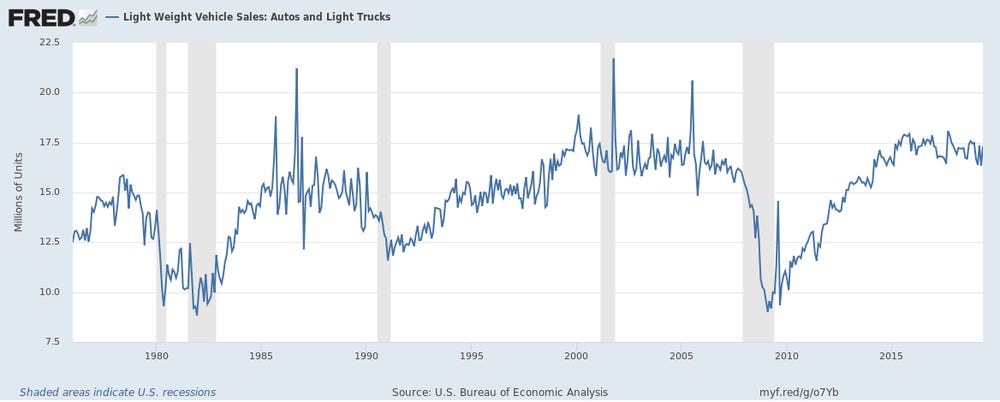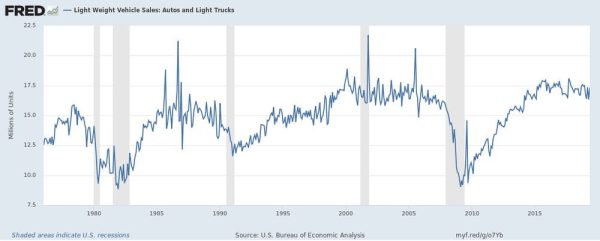The Persistence of the Auto Industry – Before & After Crisis
More and more each day, one thought that sticks with me and continues to resound: this industry has survived crisis before and will again.
The current crisis is breeding innovation across our industry. Dealerships that may have never thought they’d turn to a virtual storefront or offer pick-up and delivery services for customers are suddenly turning into true digital retailers and engaging consumers however they can.
Vendors are donating to relief causes on dealers’ behalves and providing additional services to help see our clients through. It’s uplifting to see vendors helping dealers so dealers can in turn help consumers, proving that we as an overall community are indeed here for each other.
Peak sales cannot be maintained forever, but when they dip, they recover and often soar to new heights after a crisis. Looking back on the fallout of 9/11 and the Great Recession, with many states under ‘shelter in place’ orders and dealerships across the country closed, we inevitably cannot help but feel panic. To overcome that feeling and start selling cars, dealerships need to take this time to think about how to evolve their business into what the ‘new normal’ will look like when this is over.
While it’s true that current projections for how the rest of the year will turn out for vehicle sales is not pretty, now may be a good time to look back on how we have recovered in the past.
September 11, 2001
In a recent article from AdAge, they reminded us that only 10 days after 9/11, General Motors aired “‘Keep America Rolling’, combining a pro-America pitch with zero percent financing.” Despite the tragedy, they kept thinking forward, and because of this and the acts of other brands, our industry benefited.
September 2001 saw 16M unit sales. A dip from 17M had already occurred in July before 9/11. Rather than continue a downward spiral during what was already a recession year, October 2001 saw an all-time high of nearly 22M unit sales and continued into a steady plateau afterward. “2001, a recession year, ended up as what was then the second-best year ever for U.S. auto sales.”
While this spike didn’t hold long, the recession itself ended only two months after the events of 9/11, in part because of the resilience of marketers and the auto industry giving consumers a reason to spend.
The Great Recession
Beginning at the end of 2007, the Great Recession saw a constant dip from 16M unit sales, hitting a record low of 9M in February 2009.
Here again is that look at US auto sales since the mid-1970s:

While eyes immediately go to the dips, it is important to notice the steady rises after each recession, especially after 2009. Brands and Dealers had to adjust their thinking to stay afloat and there were lessons learned then that can apply to now.
Auto News reported on a survey by Cars.com of 94 franchised dealers asked to cite the most useful strategies they employed for surviving into 2010.
- 38.3% Focused on used-vehicle business
- 29.8% Reduced advertising
- 26.6% Relied on fixed operations
- 21.3% Focused on F&I
- 21.3% Nothing in particular/not sure
- 11.7% Cut staff
- 6.4% Closed underperforming stores to focus on the good ones
- 5.3% Other
- 2.1% Kept all staff, but cut salaries across the board
As much as some of this may look how you’d expect, dealers clearly innovated and focused heavily on fixed ops, something the industry had already been leaning toward again in recent months before COVID-19 struck.
Service remains the cornerstone for retention and advocacy, and that may mean instituting many of the changes other dealers have already enacted with at-home services.
As Auto News stated of the Great Recession: “Everywhere, dealers got granular. They analyzed performance metrics and conducted weekly, storewide financial updates. Meanwhile, they made hospitality to customers a priority. Many conducted free service clinics on weekends to attract customers. Overall, more effort went into training, which had an unexpected payoff: brainstorming of unique marketing and sales strategies.”
Sounds familiar? It should, because this is exactly what is happening now.
During the Great Recession, sales recovered with a constant upward trajectory, returning to 16M unit sales in March 2014 and has maintained a nearly consistent 17M for years since. That was certainly a different sort of crisis than we face today and required in some cases very heavy government intervention, but we’re seeing that too, with bills in the works to help automotive dealerships, other essential businesses, and the American public survive and recover when this too subsides.
In the months after the last recession, CNBC reported that the unemployment rate peaked at 10 percent. As of May 2019, Business Insider said it was at a 50-year low of only 3.6%. We knew we were at a turning point, that the good times might not plateau forever but would eventually fall. We did not know how that turning point would hit us.
Regardless of the face of this current crisis, what we have learned and are already striving to do during uncertain times, should offer hope that we will overcome this crisis too. All we must do is look to the past to see that we can survive anything and set new heights together when recovery is upon us.
Outsell is 100% virtual today and for as long as we need to be – we do not shut down. We never stop working. We will continue to be here for our dealers and this industry in whatever ways we can.
Learn more about how you can combat the current crisis with this auto industry infographic and at https://www.outsell.com/covid-19-response.

